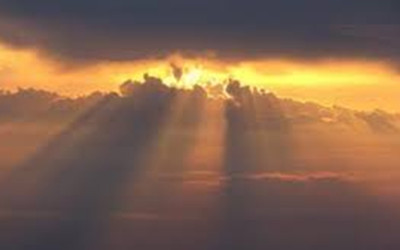"Do you think that I have come to establish peace on the earth? No, I tell you, but rather division." I have to admit I've always had some difficulty with these words. The Lord asks and answers his own question, without even giving us a chance to answer. And the answer he gives is certainly not one that any of us would have given.
 Our brothers and sisters who made up the earliest Christian communities lived in an age of persecution and fear, and with a very vivid sense of expecting the second coming of Jesus at any moment. So being prepared, being ready for His appearance was a very powerful motivation for them to be faithful in living out the Gospel every day and in every circumstance. It made their lives heroic. It made their witnessing in faith very courageous and consistent.
Our brothers and sisters who made up the earliest Christian communities lived in an age of persecution and fear, and with a very vivid sense of expecting the second coming of Jesus at any moment. So being prepared, being ready for His appearance was a very powerful motivation for them to be faithful in living out the Gospel every day and in every circumstance. It made their lives heroic. It made their witnessing in faith very courageous and consistent.
As time passed, Jesus did not in fact return and the sense of urgency passed. It was easier to become complacent, to grow comfortable with compromise, and to put off real conversion. All of the Gospel messages about being prepared had to be reinterpreted and very often the motivation for authentic Christian living became the inevitability and the unpredictability of death. But for us, being prepared has to mean something else. It has to imply a profound sense of commitment and fidelity to the Gospel and to Christian values. It means that this attitude of mind and heart becomes second nature to us, is always present. and directs and affects all of our choices.
Yes, we do need to be prepared, always. We do have to live each day trying to imitate the life of Jesus as perfectly as we can. His ministry flowed from his belief that living in love was living in God. He believed that His intimate understanding of God would be "good news" to all people and that it would bring freedom to those held captive, bring sight to the blind and set the downtrodden free.
But this is a freedom that is far different from what we might expect. By his life we are set free from images, ideas and practices that bind us into the enslavement of thinking and acting as if we had all of the answers. We are set free from the fear and abandonment of a distant, impersonal God. We are set free from divisions that divide us and set us against one another. This is a freedom that challenges us to break down barriers and to take personal responsibility for the emergence of God's reign in this world.
And maybe that is why Jesus said that He has not come to "bring peace." His message is one that rattles our cage, that shakes us out of our complacency. It makes us uncomfortable. He lights his fire within us and tells us that it is not enough that we just listen and keep these words to ourselves.
Truth cannot be silent or be sacrificed to keep peace. We are not called to keep the peace, to accept the status quo. Rather, we are called to be the peace. And becoming the peace is not always peaceful. Sometimes getting to peace involves risking the peace.
We are called to change the world. This is a huge mission. But we continue to believe that it is possible despite the risks. We continue to hope. This is the hope that was expressed by Jesuit theologian Teilhard de Chardin who wrote, “Some day, after mastering the winds and the waves and the tides and gravity, we will harness for God the energies of love. Then, for the second time in the history of the world, humans will have discovered fire.”




